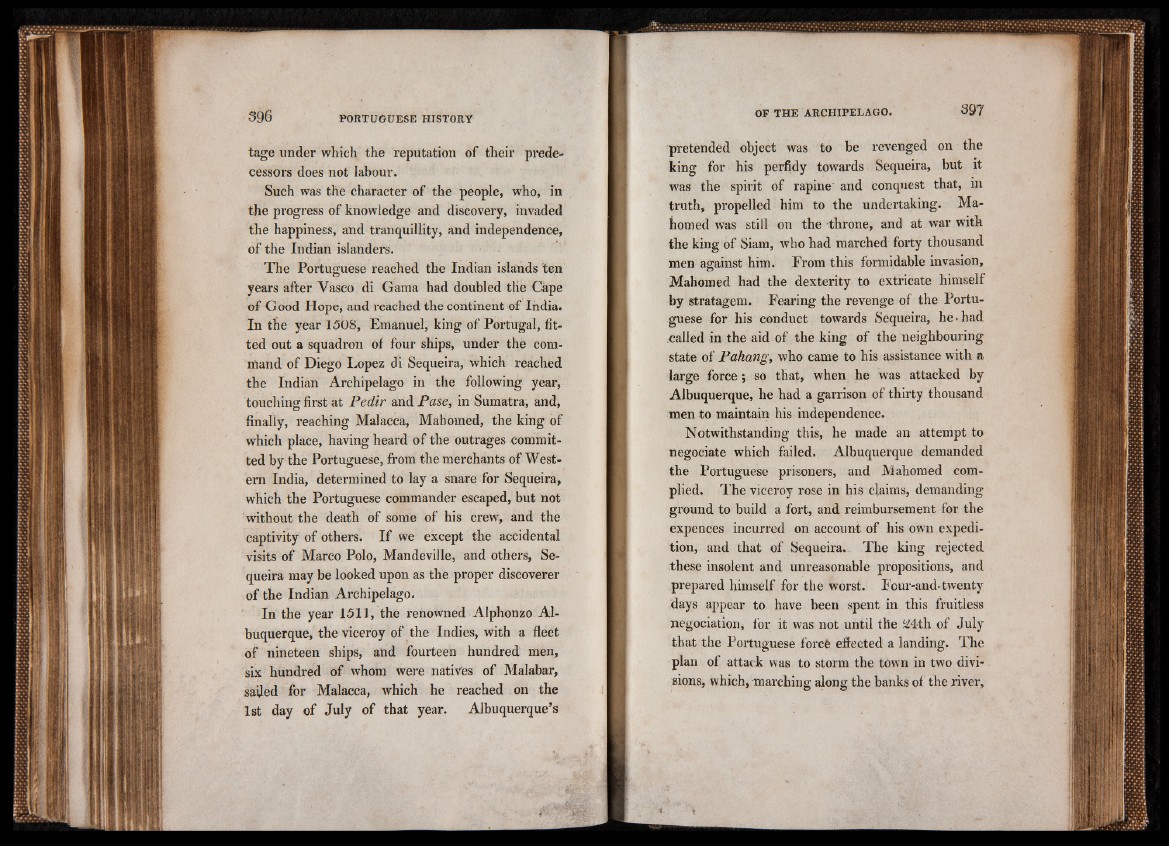
tage under which the reputation of their predecessors
does not labour.
Such was the character of the people, who, in
the progress of knowledge and discovery, invaded
the happiness, and tranquillity, and independence,
of the Indian islanders.
The Portuguese reached the Indian islands ten
years after Yasco di Gama had doubled the Cape
of Good Hope, and reached the continent of India.
In the year 1508, Emanuel, king of Portugal, fitted
out a squadron of four ships, under the command
of Diego Lopez di Sequeira, which reached
the Indian Archipelago in the following year,
touching first at Pedir and Pase, in Sumatra, and,
finally, reaching Malacca, Mahomed, the king of
which place, having heard of the outrages Committed
by the Portuguese, from the merchants of Western
India, determined to lay a snare for Sequeira,
which the Portuguese commander escaped, but not
without the death of some of his crew, and the
captivity of others. If we except the accidental
visits of Marco Polo, Mandeville, and others, Sequeira
may be looked upon as the proper discoverer
of the Indian Archipelago.
In the year 1511, the renowned Alphonzo Albuquerque,
the viceroy of the Indies, with a fleet
of nineteen ships, and fourteen hundred men,
six hundred of whom were natives of Malabar,
sailed for Malacca, which he reached on the
1st day of July of that year. Albuquerque’s
pretended object was to be revenged on the
king for his perfidy towards Sequeira, but it
was the spirit of rapine and conquest that, in
truth, propelled him to the undertaking. Ma-
tomed was still on the ‘throne, and at war with
the king of Siam, who had marched forty thousand
men against him. From this formidable invasion,
Mahomed had the dexterity to extricate himself
by stratagem. Fearing the revenge of the Portuguese
for his conduct towards Sequeira, he-had
called in the aid of the king of the neighbouring
state of Pahang, who came to his assistance with a
large force ; so that, when he was attacked by
Albuquerque, he had a garrison of thirty thousand
men to maintain his independence.
Notwithstanding this, he made an attempt to
negociate which failed. Albuquerque demanded
the Portuguese prisoners, and Mahomed complied.
The viceroy rose in his claims, demanding
ground to build a fort, and reimbursement for the
expences incurred on account of his own expedition,
and that of Sequeira. The king rejected
these insolent and unreasonable propositions, and
prepared himself for the worst. Four-and*twenty
days appear to have been spent in this fruitless
négociation, for it was not until the iM-th of July
that the Portuguese forcé eflected a landing. The
plan of attack was to storm the town in two divisions,
which, marching along the banks of the river,